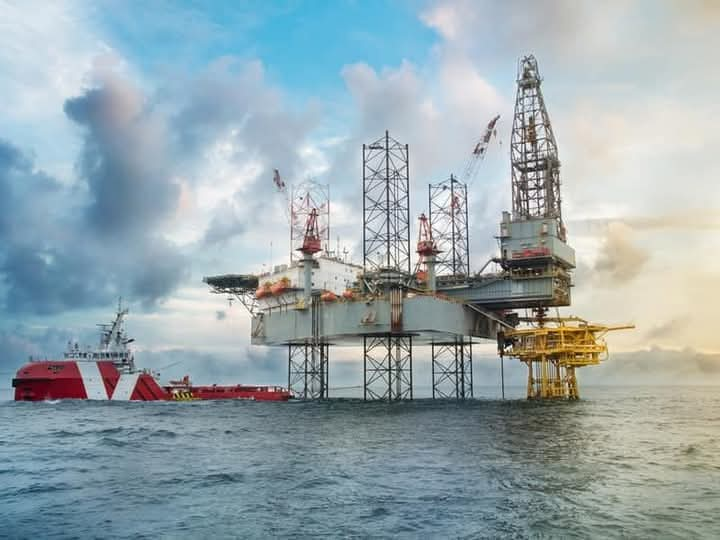… as NUPRC projects 1.4bn barrels reserve growth, boost in daily oil output
…targets $1.5bn investment CAPEX at full implementation of NGFCP
Oredola Adeola
The Nigerian Upstream Petroleum Regulatory Commission (NUPRC) has announced that the number of active oil rigs operating in the country has risen to 44 as of July 2, 2025, up from 32 recorded in May 2025, arising from a reduction in oil theft credited to kinetic and non-kinetic interventions of the Federal Government.
In addition, the Commission revealed that a total of N326.51 billion, representing the statutory 3 per cent of oil and gas operators’ operational expenditure (OPEX), has been disbursed to 145 Host Community Development Trusts (HCDTs) duly incorporated by the Corporate Affairs Commission (CAC).
The amount, sourced from 94 settlors in line with the provisions of the Petroleum Industry Act (PIA), includes a U.S. dollar component converted at an exchange rate of ₦1,529.63 to $1, as of July 1, 2025.
Engr. Gbenga Komolafe, Chief Executive of the NUPRC, disclosed these figures during his keynote presentation at the ongoing NOG Energy Week 2025 in Abuja.

He spoke during a strategic panel session titled “Pragmatically Achieving Energy Abundance,” where he emphasised the Commission’s commitment to fostering growth in the upstream sector while ensuring that host communities benefit meaningfully from resource development.
As a further boost to Nigeria’s upstream momentum, Engr. Gbenga Komolafe, Chief Executive of the Nigerian Upstream Petroleum Regulatory Commission (NUPRC), disclosed that recent approvals of Field Development Plans (FDPs) are expected to significantly enhance the country’s reserves and production output.
He explained that well drilling and re-entry interventions are central metrics used to evaluate the impact of these FDPs, particularly in terms of oil and gas recovery expectations.
According to him, from the 28 FDPs approved so far in 2025, Nigeria is projected to add 1.4 billion barrels of oil to its current reserves, with an incremental daily production of 591 barrels of oil.
Looking ahead, Komolafe noted that these FDPs are expected to attract capital expenditure running into several billion U.S. dollars over the next year.
The scale of these investments, covering 72 development wells and 19 Extended Well Tests (EWTs), underscores rising investor confidence in Nigeria’s reformed oil and gas regulatory environment.
He emphasized that this wave of approvals and associated developments is not only key to strengthening Nigeria’s production profile but also a testament to the robustness of the Petroleum Industry Act (PIA) and the Commission’s transparent licensing and monitoring processes.
Meanwhile, the NUPRC Chief Executive, Engr. Gbenga Komolafe, provided updates on the progress of the Nigerian Gas Flare Commercialisation Programme (NGFCP), a key initiative aimed at ending gas flaring and advancing Nigeria’s energy transition goals.
He revealed that the full implementation of the NGFCP is expected to attract capital expenditure (CAPEX) of approximately $1.5 billion.
According to him, the Commission has already recorded significant milestones, including the successful award of 49 flare gas assets and the completion of Milestone 1, which he described as “a huge success.”
Komolafe noted that the next phase will usher in the full development and commissioning of projects, marking a major step toward the realization of Nigeria’s flare-out objectives.
He commended some producing companies for their cooperation and commitment to the government’s climate action drive.
However, he issued a stern warning to both non-compliant producers and unwilling awardees who have failed to meet their obligations.
“Let it be clear, the Commission will not tolerate any producer that undermines this national climate-action programme, nor will it allow unwilling awardees to set us back,” he said.
He added that the NUPRC has already taken regulatory action against defaulting producers who failed to execute agreements despite several engagements, affirming that the Commission remains resolute in ensuring the full and successful implementation of the NGFCP.
Komlafe said, “Oil and gas have continued to supply over 50% of global energy needs, a figure expected to hold through 2050.
” According to IEF and S&P, sustaining this demand will require $640 billion in annual upstream investment through 2030, over $4 trillion cumulatively.
“Failure to meet this demand will threaten global stability. Let it be said: the global demand remains strong. Nigeria and Africa cannot afford to ignore this.
“Remarkably, under the decisive leadership of President Bola Ahmed Tinubu, Nigeria is undergoing a historic energy sector transformation. The Petroleum Industry Act (PIA) of 2021 laid the foundation for this reform, ” the NUPRC Boss said.
Speaking on the 2024 Executive Orders, Komolafe noted that number 40 on fiscal incentives, 41 on local content, and 42 on cost efficiency and contract timelines have catalysed massive investment inflows.
He emphasised that over $16 billion has been committed in just two years.
He said, “Through the Project One Million Barrels initiative, we are scaling up Nigeria’s production through reawakening of dormant fields, acceleration of approvals, enhancement of upstream efficiencies, etc.
Komolafe noted launched in 2024, the initiative targets an increase from 1.46 million to 2.5 million barrels per day by 2026. With 1.7 million bpd already achieved, the strategy is yielding results.
The CE further explained that Nigeria’s gas-centric transition strategy, supported by initiatives like the Decade of Gas, the NGFCP and the Presidential CNG Initiative, aims to eliminate routine flaring by 2030, reduce methane by 60% by 2031, and monetise our vast gas reserves, creating thousands of green jobs in the process.
He said, “Nigeria is building LNG capacity, deploying floating infrastructure, and leading cross-border pipeline development to fuel not only its economy but Africa’s industrial renaissance.
“Further anchoring this ambition is Nigeria’s Upstream Decarbonisation Framework, which integrates emissions tracking, MRV systems, carbon capture, and climate finance access through carbon markets.
“These aren’t just policies; they are opportunities for investment, innovation, and inclusive growth.
“In March 2025, we launched the Decarbonisation and Energy Sustainability Forum in Abuja and formally declared March 18th as Nigeria’s Upstream Decarbonisation Day.
“This annual event will serve as a rallying point for stakeholders to track progress, share knowledge, and accelerate climate-aligned development,” he said.
Engr. Komolafe explained that the Nigerian Government are enabling emissions reductions to become revenue streams through a new ecosystem of carbon services, including monitoring, consulting, and tech deployment, while maintaining high environmental and asset integrity.



